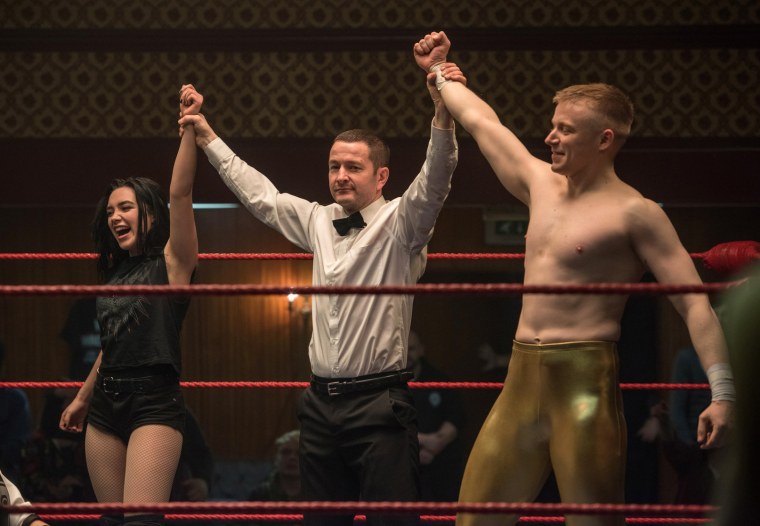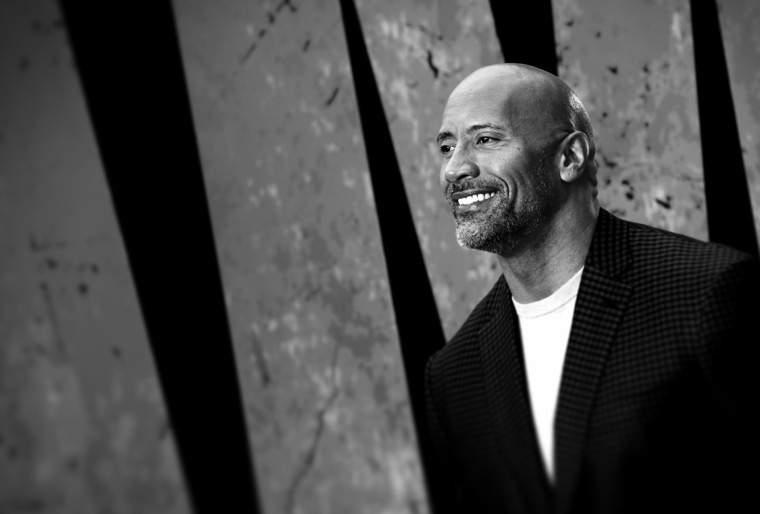One might normally be tempted to write off "Fighting with My Family," the first indie film produced by Dwayne “The Rock” Johnson (who also gives himself a supporting role), especially since most WWE Studio movies are straight-to-video quality. But “Fighting with My Family” is a surprisingly lovely piece, and a reminder that, no matter what the subject, movies always shine when everyone remembers the point is a great story told well.
Johnson’s inaugural outing as an indie producer is based on the real-life story of “Wrestling Diva” Paige, whose real name is Saraya-Jade Bevis. The youngest of three children living in the English city of Norwich’s poorest wards, Bevis grew up in a family who pulled themselves out of poverty by inventing a local wrestling promotion, World Association of Wrestling — using themselves and their children as headliners. After sending endless tapes of their family’s matches to the WWE, Saraya and her brother were given tryouts and, at the age of 18, the renamed “Paige” was accepted into the WWE’s developmental system. She eventually appeared first on NXT, the company’s “minor league” division, before moving up to the main roster and winning the Diva’s Championship at the record-setting age of 21.

On paper, this movie sounds like another color-by-numbers sports piece, full of all the stereotypical hardship moments one would expect. And WWE movies in particular are typically terrible — especially ones set in the ring, mostly they don’t show the reality of a “sport” that most mainstream outlets refuse to take seriously — and with good reason sometimes. Paige, too, seems like an unlikely subject for a fascinating biopic: She had only a shortish career of middling moves during her six years (2012-2018) in the WWE, and the last two of them were mostly spent either suspended for “wellness violations” or appearing in non-wrestling roles.
But while the script has its generic moments — like the montage of Paige working out on the beach during various sunsets set to a Thunderpussy cover of “Taking Care of Business ” — the actual story itself is gold.
Bevis’ parents were at rock bottom when they met, when her mother was a homeless junkie and her father an ex-prisoner. Their love of wrestling helped pull them out of abject poverty, put food on their table and raise three kids. Nick Frost (“Shaun of the Dead”) plays the family patriarch Ricky, and Lena Headey (“Game of Thrones”) is mother Julia; they are, by turns, screamingly funny, utterly heartfelt, and sometimes just slightly terrifying. (The home movie footage during the closing credits shows how close some of the scenes are to the reality of their lives too.)
Brother Zak — the one who gets left behind when the WWE comes calling — is played by Jack Lowden (“War & Peace”), and his portrait of a young man whose dreams died on the vine is pitch perfect.
And then there’s Saraya/Paige, played by Florence Pugh, best known for her Shakespearean performances; her Lady Macbeth won her the British Independent Film award for Best Actress. In lesser hands, the role could easily descend into little more than caricature, but Pugh gives life to even the most groan-worthy obligatory moments, making them work.
If anything, the weakest part of the film are the parts set in the WWE itself, despite endless cameos from the charisma machine known then as “The Rock”; as mentioned, those who run WWE Studios seemingly have little interest or desire to show the reality of what it takes to make it in their wrestling entertainment business. For all that the movie reminds the viewer wrestling isn’t fake but rather fixed — and there is a difference — the NXT developmental scenes are shockingly free of any injuries, or even minor bruising, even when Paige’s rookie opponents are at the stage of just-trained-enough to hurt someone.
And the lack of any sort of sexism in the industry as portrayed in the movie is laughable in a business in which chauvinism is of the air. The only prejudiced put-downs Paige experiences come from her own internalized misogyny (which is not explored in the slightest but simply excused as “she’s bad at making friends”). And, of course, the ending tries to pretend that Paige’s win was some sort of shocker, flying in the face of the movie’s insistence it’s not the scripted win that matters, but rather the ability to get over with the crowd.
Part of the historical revisionism is because “Fighting with My Family” is meant as a promotional tool to rewrite the history leading up to the current “Women’s Revolution” in the WWE; the final card insists Paige’s time in the WWE somehow directly lead to the new era of (semi) equality in women’s and men’s wrestling. But that is mainly false: The WWE is rather a funhouse mirror of the current social order.
The women’s division actually rose with the candidacy of Hillary Clinton, fell back when she lost, and rose again in the last year as society once again pushed forward on women’s rights. Paige’s career has little to do with any of that, as it existed mainly during an in-between era of women's wrestling after they stopped pushed Blonde Barbie girls for the Diva’s pink butterfly belt, but before the company began developing women who can really wrestle at the same level as men.
The irony is that Pugh is shorter and broader that the real-life Paige and, in the final scenes in the ring, actually looks like a someone who could take the dolled-up version of the women’s champion, A.J. Lee, down in a fight. The real Lee was styled as a working-class tomboy Barbie in Chuck Taylors, while the real-life Paige was a thinner and willowier Goth Barbie (and dressed far more scantily clad than the movie would have it).
And yet, I laughed, I cried and I cheered; the performances across the board are great. The film really makes one understand how people get into wrestling, both as viewers and fans. Paige may not have been that great of a wrestler, but her story inspired a fine film, and WWE Studios would be smart to make more of them.


